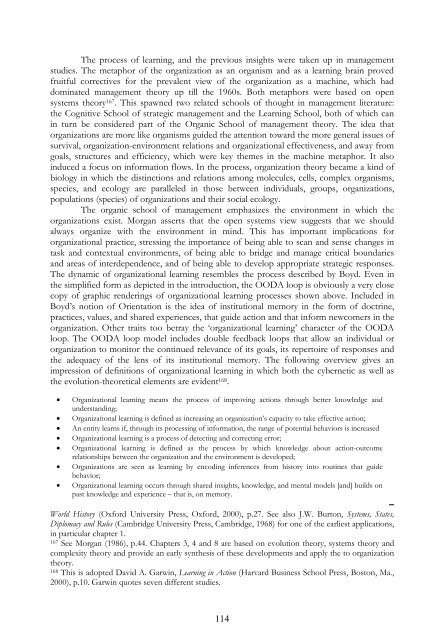Science, Strategy and War The Strategic Theory of ... - Boekje Pienter
Science, Strategy and War The Strategic Theory of ... - Boekje Pienter
Science, Strategy and War The Strategic Theory of ... - Boekje Pienter
You also want an ePaper? Increase the reach of your titles
YUMPU automatically turns print PDFs into web optimized ePapers that Google loves.
<strong>The</strong> process <strong>of</strong> learning, <strong>and</strong> the previous insights were taken up in managementstudies. <strong>The</strong> metaphor <strong>of</strong> the organization as an organism <strong>and</strong> as a learning brain provedfruitful correctives for the prevalent view <strong>of</strong> the organization as a machine, which haddominated management theory up till the 1960s. Both metaphors were based on opensystems theory 167 . This spawned two related schools <strong>of</strong> thought in management literature:the Cognitive School <strong>of</strong> strategic management <strong>and</strong> the Learning School, both <strong>of</strong> which canin turn be considered part <strong>of</strong> the Organic School <strong>of</strong> management theory. <strong>The</strong> idea thatorganizations are more like organisms guided the attention toward the more general issues <strong>of</strong>survival, organization-environment relations <strong>and</strong> organizational effectiveness, <strong>and</strong> away fromgoals, structures <strong>and</strong> efficiency, which were key themes in the machine metaphor. It alsoinduced a focus on information flows. In the process, organization theory became a kind <strong>of</strong>biology in which the distinctions <strong>and</strong> relations among molecules, cells, complex organisms,species, <strong>and</strong> ecology are paralleled in those between individuals, groups, organizations,populations (species) <strong>of</strong> organizations <strong>and</strong> their social ecology.<strong>The</strong> organic school <strong>of</strong> management emphasizes the environment in which theorganizations exist. Morgan asserts that the open systems view suggests that we shouldalways organize with the environment in mind. This has important implications fororganizational practice, stressing the importance <strong>of</strong> being able to scan <strong>and</strong> sense changes intask <strong>and</strong> contextual environments, <strong>of</strong> being able to bridge <strong>and</strong> manage critical boundaries<strong>and</strong> areas <strong>of</strong> interdependence, <strong>and</strong> <strong>of</strong> being able to develop appropriate strategic responses.<strong>The</strong> dynamic <strong>of</strong> organizational learning resembles the process described by Boyd. Even inthe simplified form as depicted in the introduction, the OODA loop is obviously a very closecopy <strong>of</strong> graphic renderings <strong>of</strong> organizational learning processes shown above. Included inBoyd’s notion <strong>of</strong> Orientation is the idea <strong>of</strong> institutional memory in the form <strong>of</strong> doctrine,practices, values, <strong>and</strong> shared experiences, that guide action <strong>and</strong> that inform newcomers in theorganization. Other traits too betray the ‘organizational learning’ character <strong>of</strong> the OODAloop. <strong>The</strong> OODA loop model includes double feedback loops that allow an individual ororganization to monitor the continued relevance <strong>of</strong> its goals, its repertoire <strong>of</strong> responses <strong>and</strong>the adequacy <strong>of</strong> the lens <strong>of</strong> its institutional memory. <strong>The</strong> following overview gives animpression <strong>of</strong> definitions <strong>of</strong> organizational learning in which both the cybernetic as well asthe evolution-theoretical elements are evident 168 .Organizational learning means the process <strong>of</strong> improving actions through better knowledge <strong>and</strong>underst<strong>and</strong>ing;Organizational learning is defined as increasing an organization’s capacity to take effective action;An entity learns if, through its processing <strong>of</strong> information, the range <strong>of</strong> potential behaviors is increasedOrganizational learning is a process <strong>of</strong> detecting <strong>and</strong> correcting error;Organizational learning is defined as the process by which knowledge about action-outcomerelationships between the organization <strong>and</strong> the environment is developed;Organizations are seen as learning by encoding inferences from history into routines that guidebehavior;Organizational learning occurs through shared insights, knowledge, <strong>and</strong> mental models [<strong>and</strong>] builds onpast knowledge <strong>and</strong> experience – that is, on memory.World History (Oxford University Press, Oxford, 2000), p.27. See also J.W. Burton, Systems, States,Diplomacy <strong>and</strong> Rules (Cambridge University Press, Cambridge, 1968) for one <strong>of</strong> the earliest applications,in particular chapter 1.167 See Morgan (1986), p.44. Chapters 3, 4 <strong>and</strong> 8 are based on evolution theory, systems theory <strong>and</strong>complexity theory <strong>and</strong> provide an early synthesis <strong>of</strong> these developments <strong>and</strong> apply the to organizationtheory.168 This is adopted David A. Garwin, Learning in Action (Harvard Business School Press, Boston, Ma.,2000), p.10. Garwin quotes seven different studies.114
















